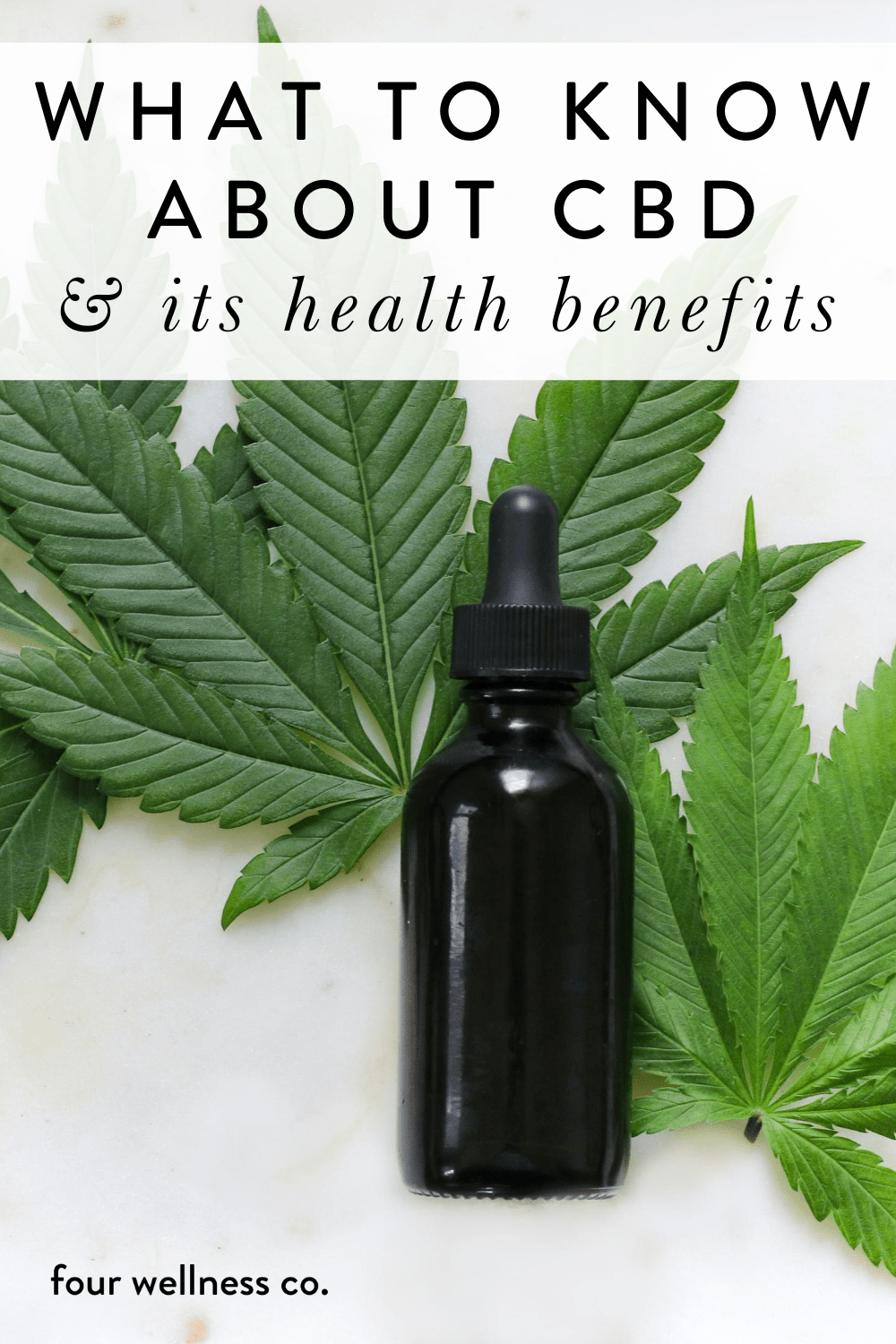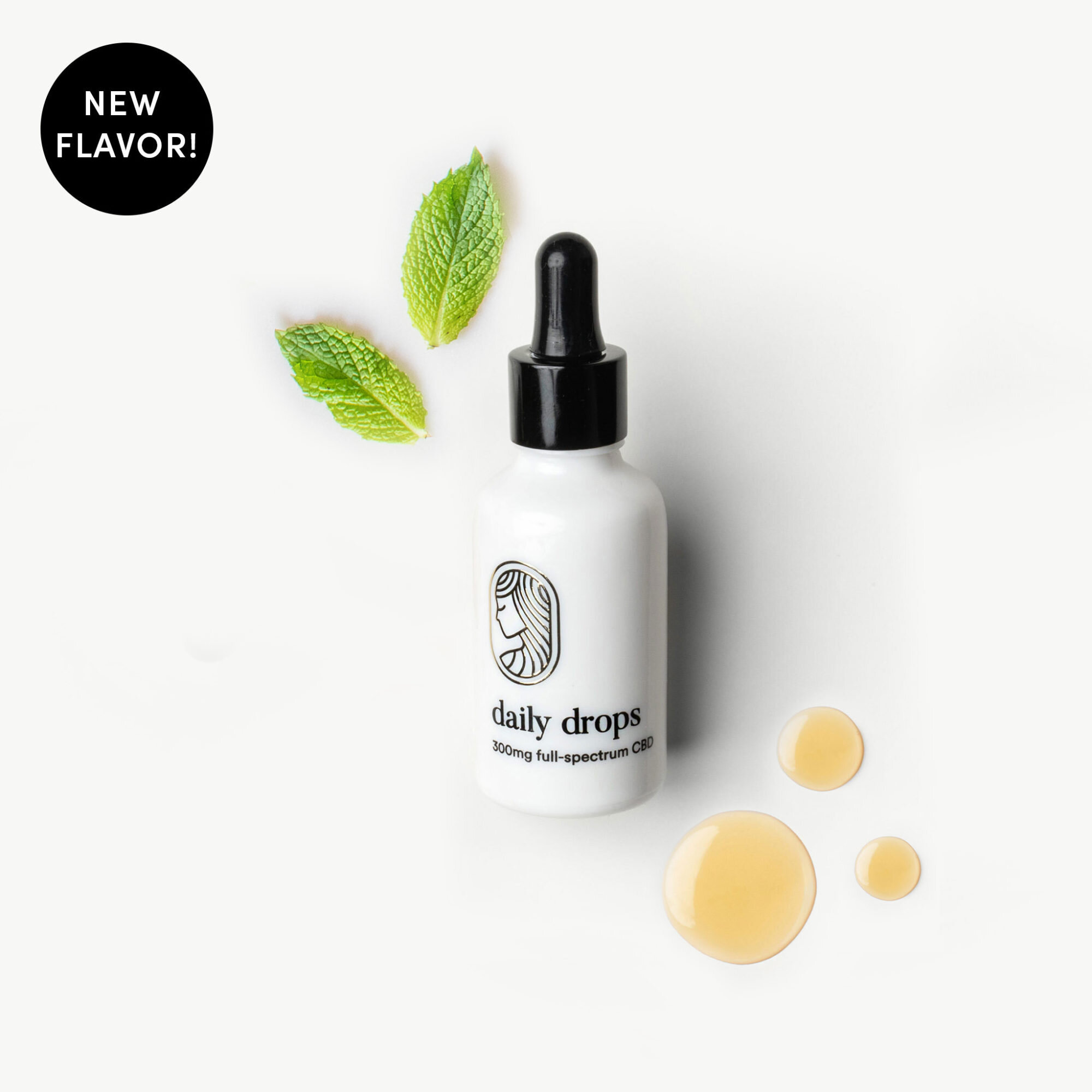What to Know About CBD & Its Health Benefits
This post contains affiliate links, through which we may earn a small commission if you choose to purchase, at no additional cost to you. We only share products or services we personally use & recommend!
Interest in the health and medicinal benefits of the cannabis sativa plant is at an all time “high.” (Pardon the pun!) 😉
CBD products are popping up across the internet and wellness world, as clinical studies suggest this special plant-based compound can effectively ease ailments like anxiety and chronic pain.
We get a lot of questions about the benefits and safety of CBD, so let’s get to it!
What is CBD?
CBD stands for cannabidiol—a naturally occurring chemical found in the cannabis sativa plant (which has two primary species, hemp and marijuana).
The compound used in commercial CBD products is derived from industrial hemp plants and differs from marijuana (the “drug”) in that it contains very low levels of THC, the psychoactive ingredient in the cannabis plant that causes a high.
So, CBD products provide a way to experience the calming effects of marijuana, without the intoxicating effects.
This is because CBD interacts with humans’ Endocannabinoid System (ECS)—a biological system that plays a role in regulating sleep, inflammation, mood, memory and more. This system produces endocannabinoids (“endo” means that they’re endogenous, or made by the human body) that interact with receptors throughout the body. Stress and aging can impact the production of our own endocannabinoids, which is why phytocannabinoids (those found in plants, like CBD) can help supplement and keep our ECS in balance.
Before we get into what the medical and health community knows about the health benefits of CBD, let’s clear up some commonly asked questions about its composition and legality:
Does CBD get you high?
Nope! CBD from industrial hemp contains less than 0.3% THC (the psychoactive chemical in marijuana), so it does not cause a high. (In contrast, marijuana contains up to 30% THC—one hundred times that of CBD.)
Is CBD legal?
Yes, CBD* is federally legal, and can be purchased and used in all 50 states.
*from industrial hemp plants, which contain 0.3% THC or less.
Is CBD safe?
Generally, yes. However, like any supplement, it may interact with other medication, so it’s best to check with your doctor before beginning use.
There’s still not much data on the effects of CBD on pregnant and nursing women (always the last groups to be studied in clinical trials), so it’s not recommended for those populations. Likewise, there’s not sufficient clinical research yet on CBD and children (other than an approved drug for epilepsy), so it’s also not recommended for kids, unless approved by your doctor.
Will CBD show up on a drug test?
Most likely, no. But, it is possible, as CBD products contain trace amounts of THC. Whether that’s enough to show up on a drug test depends on the specific products and frequency of use, as well as your own body, and how you metabolize CBD products.
The health benefits of CBD
Talk to anyone who uses CBD regularly and you’ll hear a wide range of benefits they feel it provides them. But, let’s take a look at what’s actually been shown in clinical studies.
In controlled research, CBD has been shown to:
relieve pain
reduce anxiety & depression
clear acne (likely due to its anti-inflammatory properties)
reduce blood pressure and improve cardiovascular health (possibly due in part to overall reduction of anxiety and inflammation)
alleviate symptoms from cancer treatment, like nausea, vomiting and pain
prevent the spread of breast, prostate, brain, colon and lung cancer (yeah, it’s been shown in animal studies! 🙌)
CBD has also been shown to have neuroprotective properties, and to assist with the treatment of neurological disorders, including epilepsy and multiple sclerosis. There is currently one FDA-approved CBD product: a prescription drug to treat severe forms of epilepsy.
Despite its many possible health benefits, the most common commercial uses of CBD currently tend to be for the treatment of anxiety, depression and chronic pain (via oral CBD oil or capsules) and acute muscular pain (via topical CBD lotions).
Are there any health risks associated with cbd?
CBD is well-tolerated by most people. But, some potential side effects, though rare, include fatigue, nausea and diarrhea.
The biggest known risk of CBD is its possible interaction with other medications, so it’s important to talk to your doctor and have them review your medications before you begin using a new CBD product.
Again, this discussion of risk is based on CBD derived from legally grown industrial hemp plants. It’s also important to consider risks associated with additives to CBD products. Which brings us to: how to shop for safe CBD products.
How to shop for safe CBD products
Not all commercial CBD products are created equal. Some contain different levels of CBD than what they claim, and some use agricultural practices or additives that cause them to contain toxins such as pesticides and heavy metals (yikes!).
How is CBD regulated?
CBD products are not regulated or evaluated by any government agency. With lack of regulation, there is likely a wide variance in production quality across different brands and products.
What to look for in CBD products
Some of the nuance to keep in mind as you shop for CBD products:
Production practices: How and where is the industrial hemp grown? Does the seller use organic practices? How is this tested by third parties?
Full-spectrum: Does the product contain other cannabinoids as well? Full-spectrum CBD products include other cannabinoids found in the hemp plant, in addition to CBD (there are 140 total!). This can lead to the “entourage effect,” meaning that the cannabinoids work together to boost each others’ effect (aka, they’re more powerful at achieving their goal—whether that’s reducing anxiety, easing pain, or one of the other health benefits of CBD).
Additives: Most commercial CBD products have some sort of additive—a carrier oil, a capsule, flavor or scent, etc. What are these additives, what are they made of, and how are they sourced?
THC: Particularly if you’re concerned about consuming THC, or being tested for it, it’s important to know how a CBD company tests for and reports the presence of THC in their products.
Our recommended CBD products
Equilibria is a women-owned CBD company offering organically grown full-spectrum CBD products grown exclusively on their partner farm in Colorado.
One of the key things we love is that they connect each customer with a Dosage Specialist—a real, live support service to help fine-tune your product use and dosage, and get the fit that works best for you and your goals for the product (whether that’s easing anxiety, sleeping better, reducing muscle tension, etc.).
Use code FOURWELLNESSCO for 15% off your first order!
Equilibria crafts a few different types of CBD products, formulated for different uses:
Oil drops are held under the tongue for a few seconds, and absorb into your bloodstream in just a few minutes. They’re great for calming your mind before bedtime.
Use code FOURWELLNESSCO for 15% off your first order!
FOUR WELLNESS TIP
Check with your doctor to determine if CBD products may be a good fit for supporting your wellness goals.














